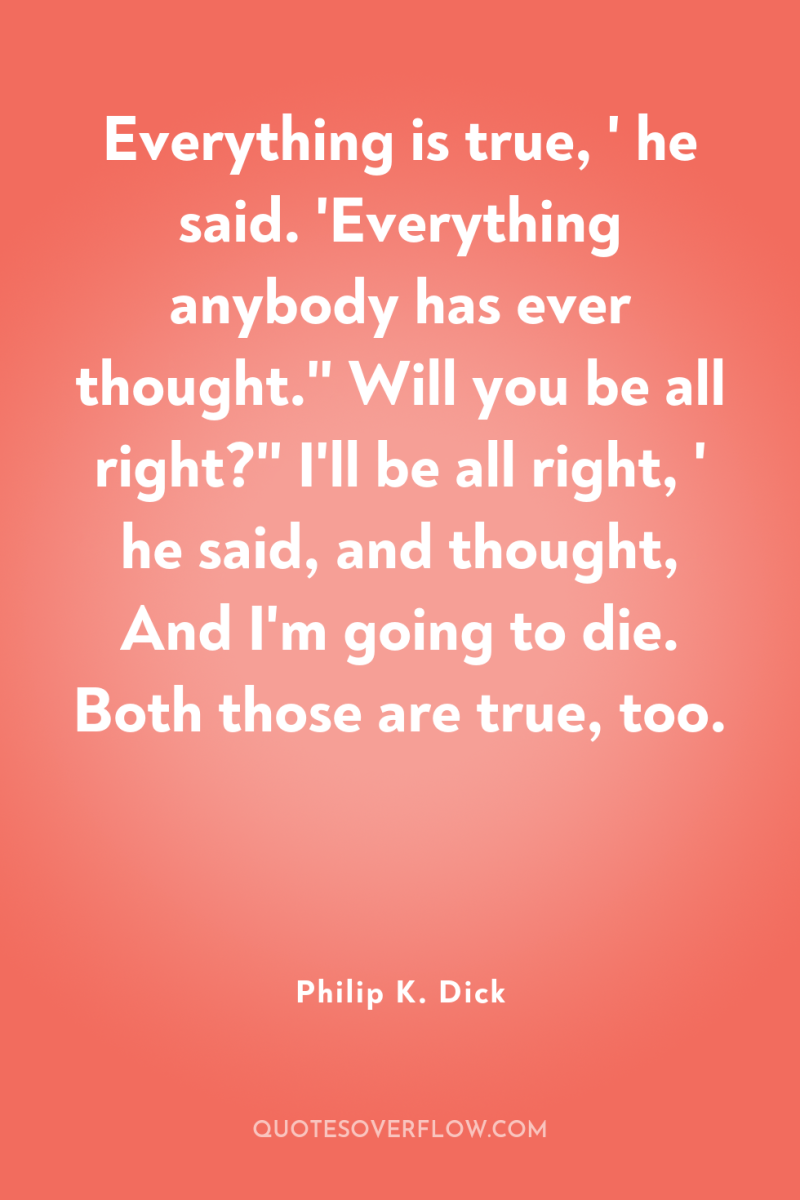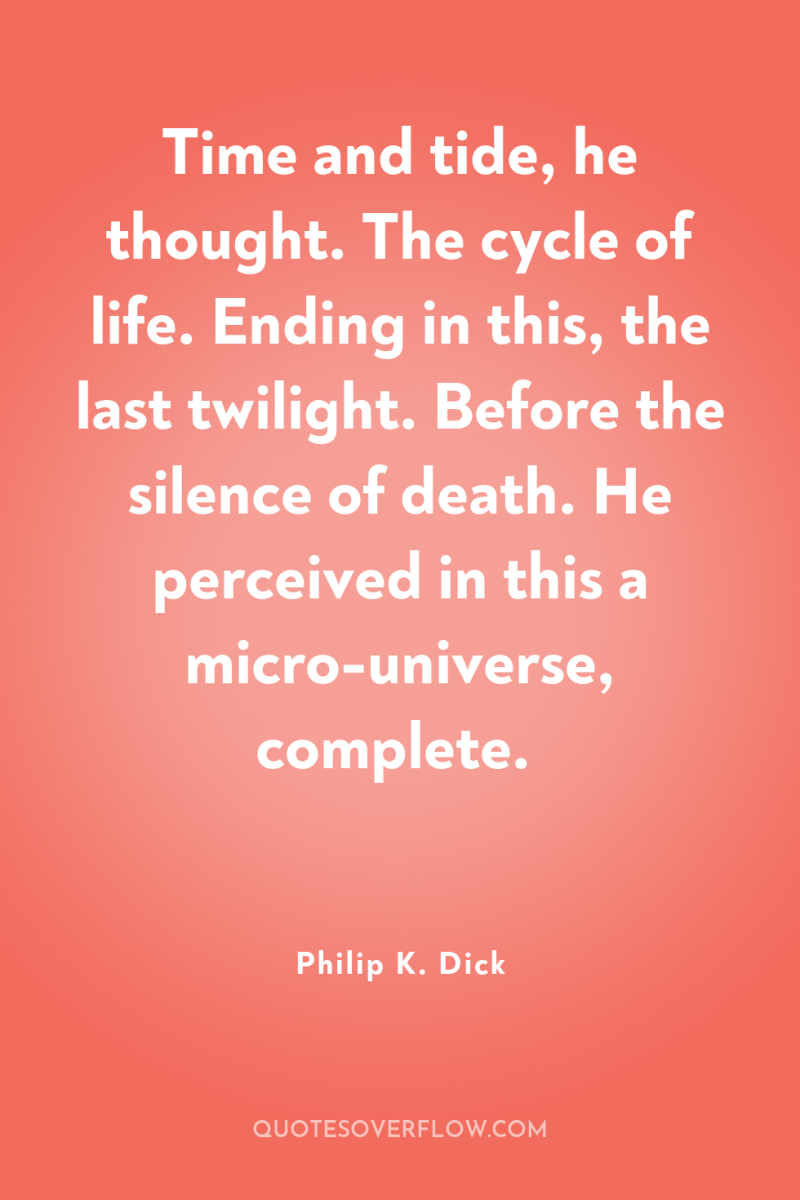1
You will be required to do wrong no matter where you go. It is the basic condition of life, to be required to violate your own identity. At some time, every creature which lives must do so. It is the ultimate shadow, the defeat of creation; this is the curse at work, the curse that feeds on all life. Everywhere in the universe.Philip K. Dick

2
Everything is true, ' he said. 'Everything anybody has ever thought.'' Will you be all right?'' I'll be all right, ' he said, and thought, And I'm going to die. Both those are true, too.Philip K. Dick
3
But as he plodded along a vague and almost hallucinatory pall hazed over his mind; he found himself at one point, with no notion of how it could be, a step from an almost certain fatal cliffside fall–falling humiliatingly and helplessly, he thought; on and on, with no one even to witness it. Here there existed no one to record his or anyone else's degradation, and any courage or pride which might manifest itself here at the end would go unmarked: the dead stones, the dust-stricken weeds dry and dying, perceived nothing, recollected nothing, about him or themselves.Philip K. Dick

4
Time and tide, he thought. The cycle of life. Ending in this, the last twilight. Before the silence of death. He perceived in this a micro-universe, complete.Philip K. Dick

5
There, at her console, he dialed 594: pleased acknowledgement of husband's superior wisdom in all mattersPhilip K. Dick

6
You will be required to do wrong no matter where you go. It is the basic condition of life, to be required to violate your own identity.Philip K. Dick
7
Silence. It flashed from the woodwork and the walls; it smote him with an awful, total power, as if generated by a vast mill. It rose from the floor, up out of the tattered gray wall-to-wall carpeting. It unleashed itself from the broken and semi-broken appliances in the kitchen, the dead machines which hadn’t worked in all the time Isidore had lived here. From the useless pole lamp in the living room it oozed out, meshing with the empty and wordless descent of itself from the fly-specked ceiling. It managed in fact to emerge from every object within his range of vision, as if it–the silence–meant to supplant all things tangible. Hence it assailed not only his ears but his eyes; as he stood by the inert TV set he experienced the silence as visible and, in its own way, alive. Alive! He had often felt its austere approach before; when it came it burst in without subtlety, evidently unable to wait. The silence of the world could not rein back its greed. Not any longer. Not when it had virtually won.Philip K. Dick
8
Maybe I shouldn’t have told you——about it being electrical.” She put her hand out, touched his arm; she felt guilty, seeing the effect it had on him, the change.“ No, " Rick said. “I’m glad to know. Or rather——“ He became silent. “I’d prefer to know.Philip K. Dick
9
What about -- not sex -- but love?'' Love is another name for sex.'' Like love of country, ' Rick said. 'Love of music.Philip K. Dick
10
Maybe it could be depression, like you get. I can understand now how you suffer when you’re depressed; I always thought you liked it and I thought you could have snapped yourself out any time, if not alone, then by means of the mood organ. But when you get that depressed you don’t care. Apathy, because you’ve lost a sense of worth.Philip K. Dick
11
The tyranny of an object, he thought. It doesn't know I exist.Philip K. Dick
12
You mean old books?"" Stories written before space travel but about space travel."" How could there have been stories about space travel before --""The writers, " Pris said, "made it up.Philip K. Dick
13
Empathy, evidently, existed only within the human community, whereas intelligence to some degree could be found throughout every phylum and order including the arachnida. For one thing, the empathic faculty probably required an unimpaired group instinct; a solitary organism, such as a spider, would have no use for it; in fact it would tend to abort a spider’s ability to survive. It would make him conscious of the desire to live on the part of his prey. Hence all predators, even highly developed mammals such as cats, would starve. .Philip K. Dick
14
Yet, the dark fire waned: the life force oozed out of her, as he had so often witnessed before with other androids. The classic resignation. Mechanical, intellectual acceptance of that which a genuine organism - with two billion years of the pressure to live and evolve hagriding it - could never have reconciled itself to.Philip K. Dick
15
I lifted you from the tomb world just now and I will continue to lift you until you lose interest and want to quit. But you will have to stop searching for me because I will never stop searching for you.( Mercer)Philip K. Dick
16
Empathy, he once had decided, must be limited to herbivores or anyhow omnivores who could depart from a meat diet. Because, ultimately, the empathic gift blurred the boundaries between hunter and victim, between the successful and the defeated.Philip K. Dick
17
Mankind needs more empathy.Philip K. Dick
18
An android, ” he said, “doesn’t care what happens to another android. That’s one of the indications we look for."“ Then, ” Miss Luft said, “you must be an android.Philip K. Dick
19
I wonder, he wondered, if any human has ever felt this way before about an android.Philip K. Dick
20
No one can win against kipple, " he said, "except temporarily and maybe in one spot, like in my apartment I've sort of created a stasis between the pressure of kipple and nonkipple, for the time being. But eventually I'll die or go away, and then the kipple will again take over. It's a universal principle operating throughout the universe; the entire universe is moving toward a final state of total, absolute kippleization.Philip K. Dick
21
Maybe I'll go where I can see stars, he said to himself as the car gained velocity and altitude; it headed away from San Francisco, toward the uninhabited desolation to the north. To the place where no living thing would go. Not unless it felt that the end had come.Philip K. Dick